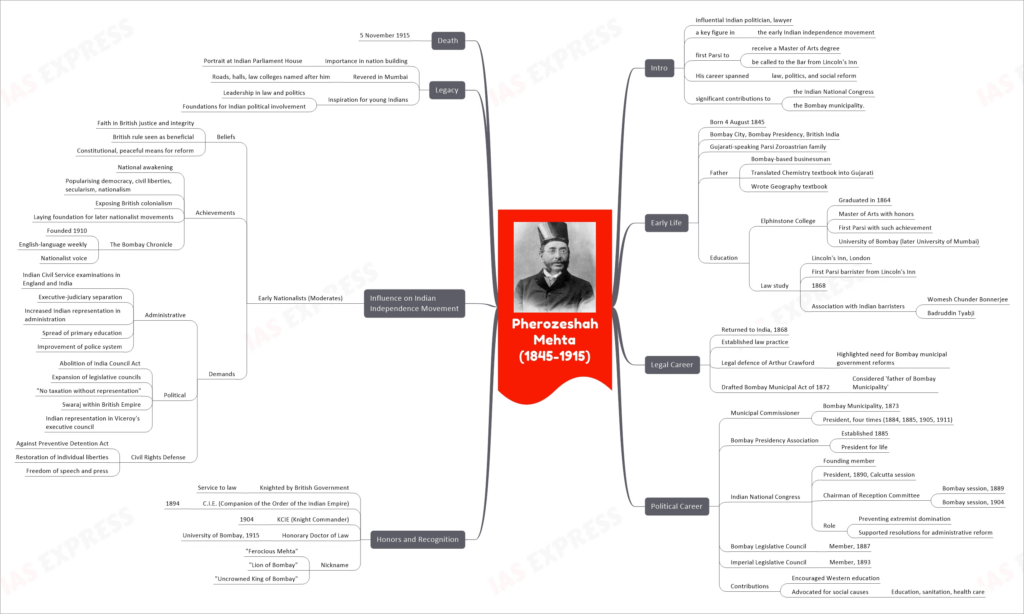Pherozeshah Mehta (1845-1915): The Lion of Bombay and His Impact on India’s Freedom Struggle
Pherozeshah Mehta was an influential Indian politician, lawyer, and a key figure in the early Indian independence movement. Born into a Gujarati Parsi family in Bombay, British India, he was a pioneer in many areas, being the first Parsi to receive a Master of Arts degree and to be called to the Bar from Lincoln’s Inn. His career spanned law, politics, and social reform, with significant contributions to the Indian National Congress and the Bombay municipality.
Early Life
Birth and Family
- Pherozeshah Mehta was born on August 4, 1845, in Bombay City, Bombay Presidency, British India.
- He hailed from a Gujarati-speaking Parsi Zoroastrian family.
- His father was a Bombay-based businessman who made notable contributions to education, including translating a Chemistry textbook into Gujarati and writing a Geography textbook.
Education
- Mehta pursued his education at Elphinstone College, where he graduated in 1864.
- He earned a Master of Arts with honors, becoming the first Parsi to achieve such a distinction at the University of Bombay (later University of Mumbai).
- He furthered his education by studying law at Lincoln’s Inn, London, becoming the first Parsi barrister from Lincoln’s Inn in 1868.
- During his time in London, he developed associations with fellow Indian barristers, including Womesh Chunder Bonnerjee and Badruddin Tyabji.
Legal Career
- Mehta returned to India in 1868 and established a successful law practice.
- One of his notable cases was the legal defense of Arthur Crawford, where he emphasized the need for municipal government reforms in Bombay.
- Mehta’s contributions led to the drafting of the Bombay Municipal Act of 1872, earning him the title of the ‘father of Bombay Municipality.’
Political Career
Municipal Commissioner
- In 1873, Mehta assumed the role of Municipal Commissioner for Bombay Municipality and served as its President on four separate occasions (1884, 1885, 1905, 1911).
Bombay Presidency Association
- He played a pivotal role in establishing the Bombay Presidency Association in 1885 and served as its President for life.
Indian National Congress
- Pherozeshah Mehta was a founding member of the Indian National Congress.
- He served as the President of the Congress during the 1890 Calcutta session and also chaired the Reception Committee during the Bombay sessions in 1889 and 1904.
- Within the Congress, he advocated for preventing extremist domination and supported resolutions for administrative reform.
Legislative Councils
- Mehta served as a member of the Bombay Legislative Council in 1887 and later as a member of the Imperial Legislative Council in 1893.
Contributions
- He actively promoted Western education and advocated for social causes, including education, sanitation, and healthcare.
Honors and Recognition
- In recognition of his dedicated service to the legal profession, Pherozeshah Mehta was knighted by the British Government.
- He was honored with the title of C.I.E. (Companion of the Order of the Indian Empire) in 1894 and later as KCIE (Knight Commander) in 1904.
- The University of Bombay conferred upon him an honorary Doctor of Law degree in 1915.
- Pherozeshah Mehta earned several nicknames during his lifetime, including “Ferocious Mehta,” “Lion of Bombay,” and “Uncrowned King of Bombay.”
Influence on Indian Independence Movement
Early Nationalists (Moderates)
- Mehta belonged to the group of early nationalists, known as Moderates, who believed in British justice and integrity.
- They viewed British rule as beneficial and advocated for constitutional, peaceful means for reform.
Achievements
- Mehta’s contributions led to a national awakening and the popularization of democracy, civil liberties, secularism, and nationalism.
- He exposed British colonialism and laid the foundation for later nationalist movements.
- Mehta founded The Bombay Chronicle in 1910, an English-language weekly newspaper that served as a nationalist voice during the struggle for independence.
Demands
- His demands included administrative reforms such as Indian Civil Service examinations in England and India, executive-judiciary separation, increased Indian representation in administration, spread of primary education, and improvements in the police system.
- Politically, he called for the abolition of the India Council Act, expansion of legislative councils, “No taxation without representation,” and the pursuit of Swaraj (self-governance) within the British Empire.
- He also advocated for Indian representation in the Viceroy’s executive council and defended civil rights, particularly against the Preventive Detention Act, restoration of individual liberties, and freedom of speech and press.
Legacy
- Pherozeshah Mehta’s importance in nation building is evident in his portrait at the Indian Parliament House.
- He is revered in Mumbai, with roads, halls, and law colleges named after him.
- His leadership in law and politics served as an inspiration for young Indians, laying the foundations for their involvement in Indian politics.
- Pherozeshah Mehta passed away on November 5, 1915, leaving behind a legacy that continues to influence India’s political and social fabric to this day.
Pherozeshah Mehta’s legacy as a foundational figure in the Indian independence movement and in the establishment of municipal governance in Bombay is profound. His efforts in promoting education, healthcare, and sanitation, along with his leadership in the Indian National Congress, mark him as a key architect of modern India. His commitment to constitutional methods and his belief in the British sense of justice shaped the moderate phase of the Indian Nationalist Movement. His impact is enduring, with his influence still celebrated in various ways, including institutions and landmarks named after him in Mumbai.


